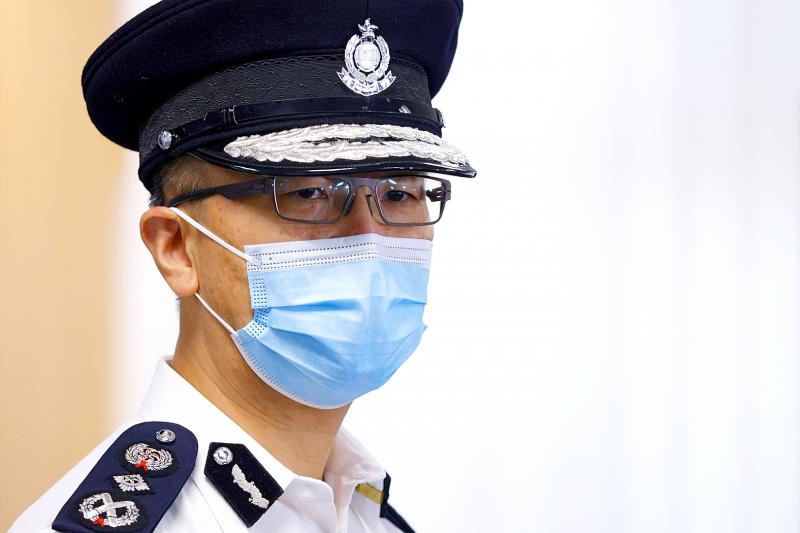Hong Kong’s new police chief has called for a “fake news” law to tackle “hostility against the police,” in what analysts see as an indication of the next phase of the crackdown on free speech in the territory.
“I understand that there are residents who are still hostile against us,” Hong Kong Police Commissioner Raymond Siu Chak-yee (蕭澤頤), 55, said at his first media briefing since taking office on Friday. “In this regard, I told my colleagues that many of these torn relationships and hostility against the police are due to fake news.”
“There is no legal definition of fake news at the moment, but if there is any legislation that could help us bring these people to justice, as law enforcers, we absolutely welcome it,” he added.

Photo: Reuters
The public image of the Hong Kong Police Force has been severely hit by pro-democracy protests that began in 2019.
Since the summer of 2019, support ratings for the territory’s once respected police force have plummeted, the Hong Kong Public Opinion Research Institute says.
Yet it was the talk of “fake news” amid the controversial closure of one of the territory’s most popular newspapers, Apple Daily, that alarmed critics.
They say that the label could be used to further muzzle dissent.
“The authorities are just adding more weapons into their pocket in order to stifle dissent,” said Chris Yeung (楊健興), a veteran journalist and a former Hong Kong Journalists Association chairman. “It looks very likely that this proposal of ‘fake news’ law will be put on the agenda in the next legislative session.”
Willy Lam (林和立), an adjunct professor at the Center for China Studies at the Chinese University of Hong Kong, worries that following last week’s closure of the Apple Daily, some less powerful and resourceful outlets might be the next target in an ongoing crackdown on free speech.
“The authorities have borrowed what mainland China is doing to penalize netizens critical of the government,” he said. “Independent journalism and media are facing a tough time in Hong Kong, and the situation may get worse.”
Hong Kong Chief Executive Carrie Lam (林鄭月娥) first floated the idea of “fake news” legislation in February, when she complained that misinformation had been on the rise since the mass protests of 2019 and the COVID-19 health crisis began.
Last month, Lam said again that she was considering the introduction of a “fake news” law to prevent “misinformation, hatred and lies.”
Shortly after that, the police sent a glossy pamphlet called “Know the facts: rumors and lies can never be right” to a few Hong Kong-based newsrooms.
Accompanying it was a letter addressed to editors, warning against “wicked and slanderous attacks” on the police.
In response to Lam’s remark, the International Federation of Journalists, a Brussels-based umbrella of media unions, said in a statement: “International experience has shown the problematic nature of such legislation, which further mires governments and courts in baseless cases and ultimately becomes a greater challenge to democracies at large.”

NATIONAL SECURITY THREAT: An official said that Guan Guan’s comments had gone beyond the threshold of free speech, as she advocated for the destruction of the ROC China-born media influencer Guan Guan’s (關關) residency permit has been revoked for repeatedly posting pro-China content that threatens national security, the National Immigration Agency said yesterday. Guan Guan has said many controversial things in her videos posted to Douyin (抖音), including “the red flag will soon be painted all over Taiwan” and “Taiwan is an inseparable part of China,” while expressing hope for expedited “reunification.” The agency received multiple reports alleging that Guan Guan had advocated for armed reunification last year. After investigating, the agency last month issued a notice requiring her to appear and account for her actions. Guan Guan appeared as required,

Japan and the Philippines yesterday signed a defense pact that would allow the tax-free provision of ammunition, fuel, food and other necessities when their forces stage joint training to boost deterrence against China’s growing aggression in the region and to bolster their preparation for natural disasters. Japan has faced increasing political, trade and security tensions with China, which was angered by Japanese Prime Minister Sanae Takaichi’s remark that a Chinese attack on Taiwan would be a survival-threatening situation for Japan, triggering a military response. Japan and the Philippines have also had separate territorial conflicts with Beijing in the East and South China

A strong cold air mass is expected to arrive tonight, bringing a change in weather and a drop in temperature, the Central Weather Administration (CWA) said. The coldest time would be early on Thursday morning, with temperatures in some areas dipping as low as 8°C, it said. Daytime highs yesterday were 22°C to 24°C in northern and eastern Taiwan, and about 25°C to 28°C in the central and southern regions, it said. However, nighttime lows would dip to about 15°C to 16°C in central and northern Taiwan as well as the northeast, and 17°C to 19°C elsewhere, it said. Tropical Storm Nokaen, currently

PAPERS, PLEASE: The gang exploited the high value of the passports, selling them at inflated prices to Chinese buyers, who would treat them as ‘invisibility cloaks’ The Yilan District Court has handed four members of a syndicate prison terms ranging from one year and two months to two years and two months for their involvement in a scheme to purchase Taiwanese passports and resell them abroad at a massive markup. A Chinese human smuggling syndicate purchased Taiwanese passports through local criminal networks, exploiting the passports’ visa-free travel privileges to turn a profit of more than 20 times the original price, the court said. Such criminal organizations enable people to impersonate Taiwanese when entering and exiting Taiwan and other countries, undermining social order and the credibility of the nation’s